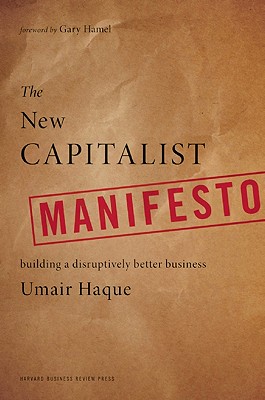Review: The New Capitalist Manifesto by Umair Haque
Fundamentally redefining capitalism in non-narrow terms. A full spectrum understanding of cost, debt, capital.

The New Capitalist Manifesto: Building a Disruptively Better Business
“Constructive capitalists aren’t merely seeking to be better than rivals in yesterday’s terms. They are fundamentally redefining what success means, to encompass the well-being of people, communities, society, and future generations; to return what you might call profit ‘plus’; profit plus social, environmental, human, and as yet unknown -unexplored kinds of – returns.”
Skip the preface. Way too fuzzy for me. Once Haque gets going in Chapter 1 though, it’s a fun ride. He does a masterful job of decimating every construct that underpins the economy as it is and points out early indicators of what it will be (assuming we can build it).
The typology of thin and thick value is great – thin is generated by a business that very narrowly defines profit, debt, success, capital. Think Gillette’s fetish for product differentiation. Thick, on the other hand depends on a deeper understanding of how business works, who it impacts, and how; and acts accordingly. Think microfinance – it builds human capital, generates financial capital, and doesn’t cost the future.
This is a key part of Haque’s thesis. By failing to account for the full costs of the Industrial economy machine, we have taken on an unsustainable debt load (environmental, human, fiscal) that eventually blows up. Rethinking what comprises capitalism enables us to transition away from this rudimentary understanding of accounting.
Anyway, the book is a must read. Especially if the following resonates with you:
“What we need, then, is a new generation of renegades, laying deeper, stronger institutional cornerstones.”
That’s precisely who this book is for. This is the kind of person who has a copy of ReWork, Brave New War, and Reinventing Collapse to put Umair’s book next to. Short, utilitarian texts, for leaders who are secure enough in their ability to innovate and execute that they are more focused on how to think, rather than what.
So then the question becomes. If this is the argument for a better, constructive form of capitalism, what does a business that runs on all of its principles look like? As it turns out, I’m working on that right now with a very smart group of people in the form of Picture This.
-Shlok
Sign up for my newsletter.


Comments (2)